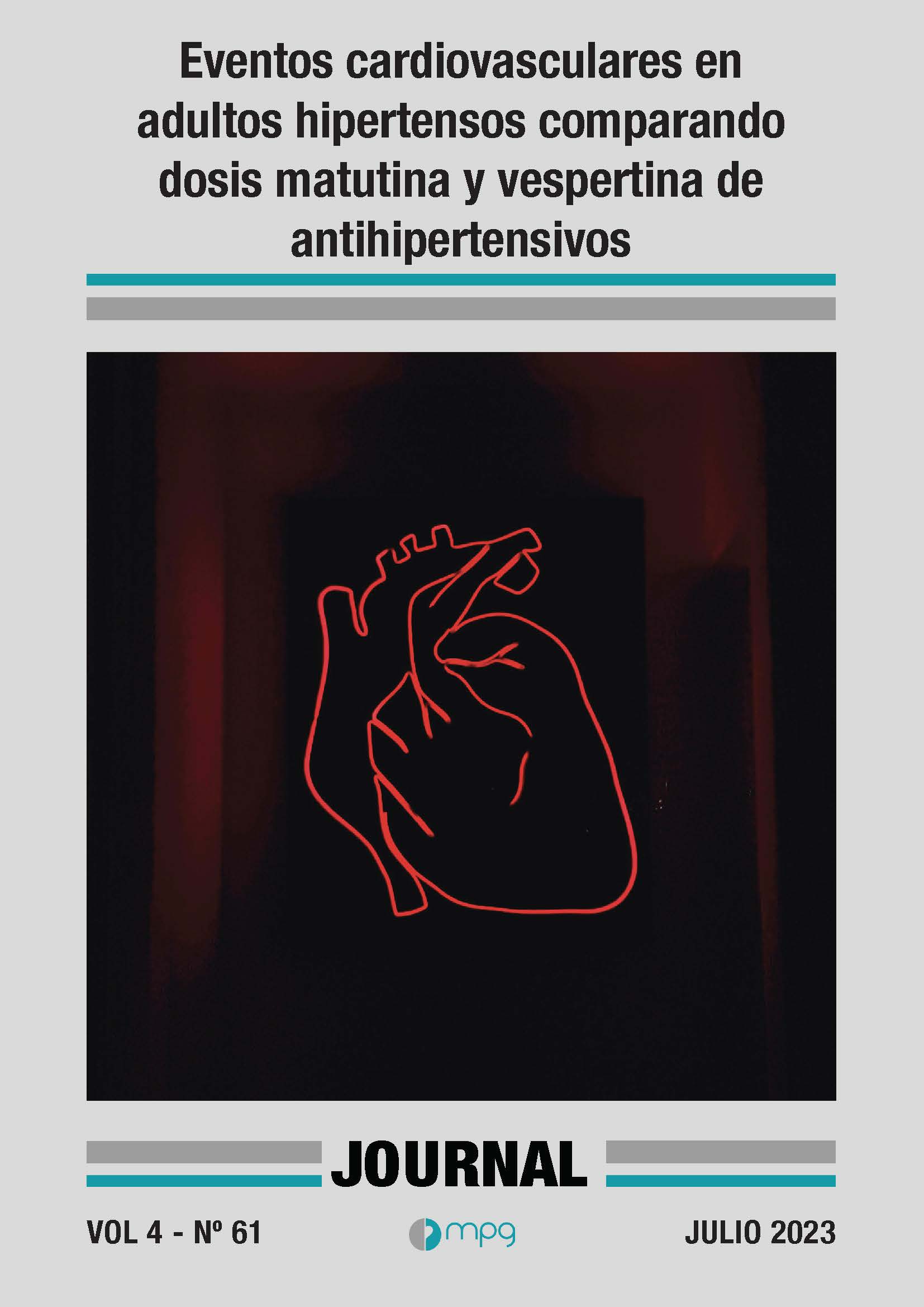9. Eventos cardiovasculares en adultos hipertensos comparando dosis matutina y vespertina de antihipertensivos
Palabras clave:
antihipertensivos, dosis matutina, dosis vespertina, Evento cardiovascularResumen
Estudios recientes sugieren que la administración vespertina de los fármacos antihipertensivos mejora la tasa de eventos cardiovasculares, pero esos resultados han generado una gran controversia. Este estudio establece como objetivo determinar si la administración vespertina mejora esos eventos en comparación a la administración matutina.
Recent studies suggest that evening administration of antihypertensive drugs improves the rate of cardiovascular events, but these results have generated great controversy. This study aims to determine whether evening administration improves these events compared to morning administration.
Referencias
Vol. 39. Págs. 3021-3104. 2018. B Williams, G Mancia, W Spiering, et al. 2018 ESC/ESH guidelines for the management of arterial hypertension. Eur Heart J.
Vol. 136. 2019. Hypertension in adults: diagnosis and management. NICE guideline. doi: https://www.nice.org.uk/guidance/ng136
Vol. 23. Nº 10. Págs. 645-53. 2009. Fagard RH, Thijs L, Staessen JA, Clement DL, De Buyzere ML, De Bacquer DA. Night-day blood pressure ratio and dipping pattern as predictors of death and cardiovascular events in hypertension. J Hum Hypertens. doi: 10.1038/jhh.2009.9.
Vol. 24. Nº 12. Págs 2097-2107. 2022. Belloir J, Makarem N, Shechter A. Sleep and Circadian Disturbance in Cardiovascular Risk. Curr Cardiol Rep. doi: 10.1007/s11886-022-01816-z
Vol. 73. Nº 726. Págs. 16-23. 2022. Armitage LC, Davidson S, Mahdi A, Harford M, McManus R, Farmer A, Watkinson P, Tarassenko L. Diagnosing hypertension in primary care: a retrospective cohort study to investigate the importance of night-time blood pressure assessment. Br J Gen Pract. doi: 10.3399/BJGP.2022.0160.
Vol. 41. Nº 48. Págs. 4565-4576. 2020. Hermida, R. C., Crespo, J. J., Domínguez-Sardiña, M., Otero, A., Moyá, A., Ríos, M. T. et al. Bedtime hypertension treatment improves cardiovascular risk reduction: the Hygia Chronotherapy Trial. European heart journal. doi: 10.1093/eurheartj/ehz754
Vol. 27 Nº. 8. Págs. 1629-1651. 2010. Ramón C. Hermida, Diana E. Ayala, Artemio Mojón & José R. Fernández. INFLUENCE OF CIRCADIAN TIME OF HYPERTENSION TREATMENT ON CARDIOVASCULAR RISK: RESULTS OF THE MAPEC STUDY, Chronobiology International. doi:10.3109/07420528.2010.510230
Vol. 41. 2020. Hermida RC, Mojón A, Fernández JR; Hygia Project Investigators. Comparing the design of the primary-care based Hygia Chronotherapy Trial and the Internet-Based TIME Study. Eur Heart J. doi: 10.1093/eurheartj/ehaa276
Vol. 34. Págs. 2940–2948. 2013. Chowdhury R, Khan H, Heydon E, Shroufi A, Fahimi S, Moore C, Stricker B, Mendis S, Hofman A, Mant J, et al. Adherence to cardiovascular therapy: a meta-analysis of prevalence and clinical consequences.Eur Heart J. doi: 10.1093/eurheartj/eht295
Vol. 35. Nº 4. Págs 308-314. 2021. Ho CLB, Chowdhury EK, Doust J, Nelson MR, Reid CM. The effect of taking blood pressure lowering medication at night on cardiovascular disease risk. A systematic review. J Hum Hypertens. doi: 10.1038/s41371-020-00469-1.




MPG Journal - Política de privacidad